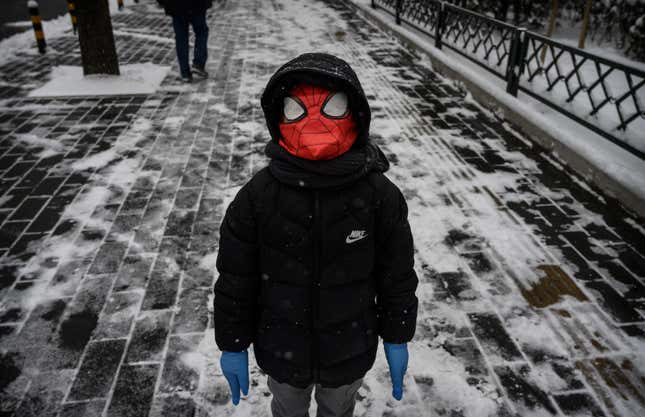
Research out this week is the latest to suggest that covid-19 may be linked to a higher risk of type 1 diabetes in children. The study found that reported diabetes cases at a large children’s hospital in San Diego significantly rose during the first year of the pandemic. However, many experts—including the study’s authors—argue that a cause-and-effect relationship between the two still isn’t firmly established.
The study was published Monday in JAMA Pediatrics and conducted by researchers at the University of California, San Diego. The authors looked at the anonymous medical records of children admitted to the university-affiliated Rady Children’s Hospital, which claims to be the largest children’s hospital on the West Coast. They studied six years of data, focusing on children diagnosed with new-onset type 1 diabetes.
From March 19, 2020 to March 19, 2021, 187 children were admitted to the hospital with a new case of type 1 diabetes, the researchers found, which was a noticeable increase from the annual counts of the prior five years. During that same time frame from 2019 to 2020, for instance, 119 children had been admitted. Cases during the pandemic were also more likely to be diagnosed with diabetic ketoacidosis, a life-threatening complication that can send people into a fatal coma.
Earlier this month, research from the Centers for Disease Control and Prevention found a similarly concerning trend among people under the age of 18. Based on medical claims data, this paper found that those under 18 diagnosed with covid-19 were significantly more likely to be newly diagnosed with diabetes than those without covid-19, at least during the first year of the pandemic. They were also more likely to be diagnosed with diabetes than those diagnosed with other respiratory infections prior to the pandemic during a similar time frame. Importantly, the study did not distinguish between type 1 and type 2 diabetes, which are caused by different mechanisms, though type 1 diabetes does tend to affect people at a younger age.
There is a clear connection between diabetes and covid-19. People with existing diabetes are known to be at higher risk for severe covid; they may have a higher risk of lingering complications afterward as well. There’s also been evidence linking covid-19 to a higher risk of developing diabetes afterward, in both adults and children. And some studies in the lab have offered a plausible explanation as to why this could be happening. It’s possible, for instance, that the virus can preferentially infect and then destroy or damage insulin-producing beta cells in the pancreas, similar to how the body’s immune system attacks these cells and causes type 1 diabetes. The infection could also somehow goad the immune system into this self-destructive state, starting the chain of events that leads to type 1.
But the overall data on whether the coronavirus can directly trigger diabetes in people, especially in children, is still very muddled, according to Daniel Drucker, an endocrinologist and professor of medicine at the University of Toronto.
Some studies in Germany and Finland have found small increases of type 1, for instance, but not necessarily among children who caught covid-19, suggesting that the indirect effects of the pandemic are to blame, not the virus. A delay in seeking care, for example, would raise the risk that a person’s initial symptoms go unnoticed until they develop serious complications like diabetic ketoacidosis. Another study from Germany also found no evidence that the first wave of the pandemic in 2020 was linked to an increase of type 1 cases not linked to autoimmunity among kids and young adults. And it’s important to note that cases of type 1 in the U.S. and elsewhere had been increasing even before the pandemic.
“What’s lacking from all of these reports is consistency, so there’s no consistent agreement worldwide,” Drucker told Gizmodo by phone. “Whether there actually is a true phenomenon related to the virus itself directly affecting either auto-immunity or beta cell destruction, I don’t think I’ve seen evidence that would allow me to make conclusions.”
Even the authors of the new study in JAMA Pediatrics are careful to note its limitations. For one, they were only able to look at whether children had an active case of covid-19 at the time of their admission, not whether they ever had been infected. In the study, about 2.1% of children tested positive for the virus. And though they were inspired to study this data after anecdotally noticing an increase in cases at their hospital, they’re still not sure why it’s happening.
“We do not know what factors from the pandemic, either directly or indirectly, account for this increase,” study author Jane Kim, clinical professor of pediatrics at UC San Diego Health, told Gizmodo in an email. “There is not yet enough evidence from us or other groups to conclude that covid is causative for diabetes in children.”
Drucker isn’t ruling out the possibility that covid really could be raising the risk of type 1 diabetes in children, or that this risk may have gotten worse between waves of the pandemic or with the emergence of variants like Omicron. But without stronger evidence, it remains possible that there’s no link to the virus itself.
“If one were to look for the smoking gun, epidemiologically, that would be children with recent onset SARS-COV-2 infection—anywhere in the last six months to 12 months—and their respective incidence of type 1 diabetes, and comparing them to a control population who hadn’t been infected, and their respective incidence of diabetes,” Drucker said. “So far, we haven’t seen that type of ‘AHA!’ report.”